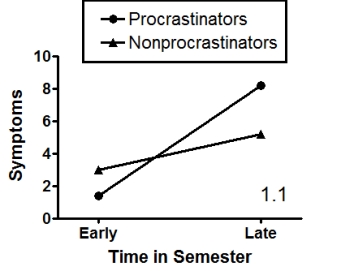Scenario I
Scenario I is based on and presents fabricated data consistent with the following study:
Tice, D. M., & Baumeister, R. F. (1997) . Longitudinal study of procrastination, performance, stress, and health: The costs and benefits of dawdling. Psychological Science, 8(6) , 454-458. doi:10.1111/j.1467-9280.1997.tb00460.x
Tice and Baumeister (1997) studied the relationship between procrastination and symptoms of physical illness in college students during an academic semester. Participants completed a questionnaire measuring procrastination. From this, they were classified as either procrastinators or nonprocrastinators. All participants also were instructed to record the number of negative health symptoms that they experienced during the first (early) and last (late) month of the semester. Figure 1.1 shows the major results of the study.
Figure 1.1 
-(Scenario I) William James might have been MOST interested in which question about procrastination?
Definitions:
Endorphins
Natural, pain-relieving chemicals produced by the body that also contribute to feelings of pleasure and well-being.
Dopamine
A neurotransmitter involved in the regulation of movement, attention, learning, mood, and motivation.
Monoamines
A group of neurotransmitters, including dopamine, norepinephrine, and serotonin, that play key roles in regulating mood, arousal, and sleep.
Acetylcholine
A neurotransmitter in both the peripheral and central nervous systems that plays a crucial role in muscle contraction and cognitive functions.
Q4: Canada, Australia, France, and Germany have lower
Q8: (Scenario II) Shown in Figure 6.2 is
Q8: A scientist theorizes that several billion years
Q21: Pretending to be a dog is an
Q29: Based on current marriage trends in the
Q46: Deception is NOT allowable in psychological research.
Q62: The advent of _ in the 1950s
Q96: By studying how quickly rats pressed levers
Q97: What is the third-variable problem in reference
Q166: Correlation is to _ as experimentation is